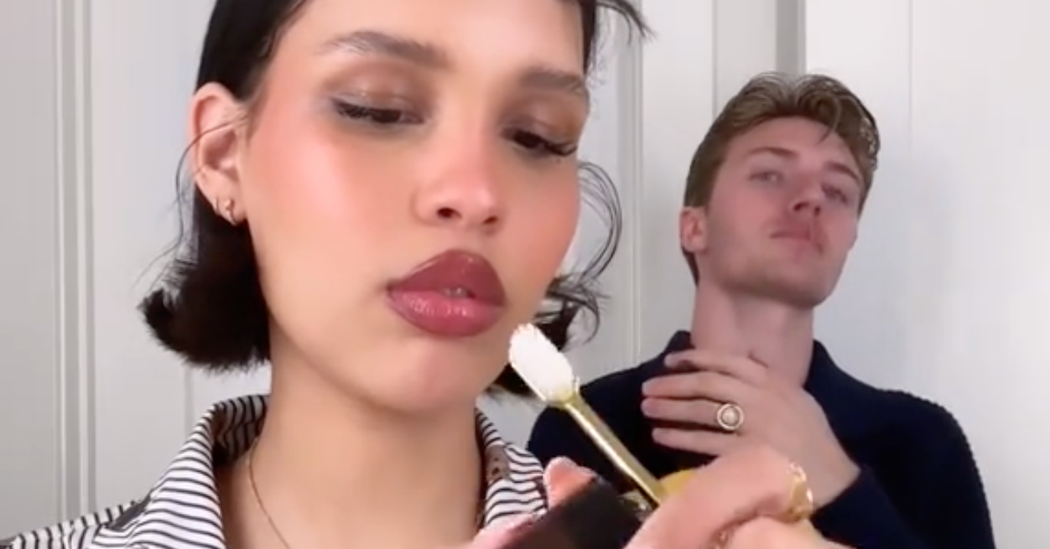Last month, the model and influencer Nara Smith said she had recently run out of sunscreen. Instead of buying more, she asked her husband, Lucky Blue Smith, to make some from scratch.
Mr. Smith’s process, which Ms. Smith posted to TikTok last month, looked more like a cooking video than anything else. Wearing an unbuttoned shirt and holding a toothpick between his lips, he combined ingredients including coconut oil, shea butter, jojoba oil and zinc oxide powder in a clear bowl.
In a certain pocket of social media, Ms. Smith has become known for such do-it-yourself content. It began with her posting recipes to satisfy food cravings, but grew to include videos of her husband making personal care products such as sunscreen, toothpaste and moisturizer from scratch.
Some commenters admire the couple’s D.I.Y. cosmetics, while others wonder whether their content is satire. But cosmetic chemists, dentists and dermatologists agree that making beauty products from scratch isn’t always a good idea. Homemade moisturizer presents few risks, but homemade sunscreen is far less likely to offer protection, and D.I.Y. toothpaste may be bad for tooth enamel, experts said.
Ms. Smith, who did not respond to requests for comment, has at times nodded to the limitations of her experience. In the toothpaste video, for example, she acknowledged that she is not a professional dentist. But at other times, as in her sunscreen TikTok, she assured viewers that her husband “is a baker, so he makes sure that everything is very precise.”
Cosmetic chemistry is not the same as baking, said Marisa Plescia, the vice president-elect of the Society of Cosmetic Chemists. Experts make products according to precise formulas; attempting that process at home when you’re not a chemist can lead to D.I.Y. products that are ineffective, don’t last long or react poorly with your skin, she said.
“Baking? You could follow a recipe that you could find online or on the back of the box,” Ms. Plescia said. “Cosmetics? Yes, it is a recipe, but it is much more difficult to follow.”
D.I.Y. Sunscreen
Ms. Smith’s sunscreen TikTok video has now been viewed more than 19 million times.
Cosmetic chemists in the United States must fulfill the requirements outlined by the Food and Drug Administration when determining which active ingredients in sunscreen are safe, and whether they can be combined, Ms. Plescia said.
Attempting to make sunscreen at home is challenging because the formulas are precise: Zinc oxide, for instance, is considered safe to use in sunscreen, but it shouldn’t make up more than 25 percent of a mixture.
Chemists also test sunscreen to ensure it provides the sun protection factor (or SPF) that you’ll see on the label, and make sure the ingredients will remain effective throughout the sunscreen’s shelf life.
Under most circumstances, homemade sunscreen offers weak and spotty protection, and it may lose its effectiveness quickly, experts said. Using ineffective homemade sunscreen exposes you to ultraviolet radiation, raising your risk of skin cancers and accelerating signs of aging, such as wrinkles and sun spots, said Dr. Brooke Jeffy, a board-certified dermatologist based in Scottsdale, Ariz.
“You are literally putting yourself in danger,” Ms. Plescia said.
TikTok Toothpaste
The Smiths’ toothpaste video now has more than 38 million views. In it, the couple makes toothpaste using bentonite clay (a gray powder made from montmorillonite and other minerals that has been used as a natural remedy), water, coconut oil, baking soda, stevia and peppermint essential oil.
Dr. Purnima Kumar, the department chair of periodontology and oral medicine at the University of Michigan, said she questioned the viability of D.I.Y. toothpaste because it’s hard to know whether the ingredients are too abrasive or contain harsh chemicals that can wear away enamel, the outermost layer of the tooth that protects from cavities.
Many ingredients used in homemade toothpaste, such as bentonite clay, haven’t been studied for their compatibility with enamel safety, Dr. Kumar added.
Enamel cannot be replaced after it’s damaged, Dr. Kumar said, and when it’s worn down, your teeth are more likely to decay or feel sensitive.
So when it comes to using homemade toothpaste, “one must consider if this is a risk worth taking,” Dr. Kumar said.
Mixing Moisturizer
When Mr. Smith ran out of store-bought moisturizer, he made his own in a video that now has more than 28 million views. To do so, he used beeswax, squalene, jojoba oil, hyaluronic acid, glycerin, vitamin E oil and beef tallow.
“If you do want to stick to more at-home recipes, using plant-based oils is a great option,” Ms. Plescia said, adding that “there are people that do make their own moisturizers all the time.”
Jojoba oil and squalene are plant oils and emollients, which means they moisturize and soften skin by reinforcing its natural barrier and forming a layer that prevents moisture from escaping; beef tallow is considered an emollient, too. Hyaluronic acid and glycerin are humectants, which moisturize by attracting and holding onto the water molecules in your skin. Beeswax has both humectant and emollient properties, while vitamin E is an antioxidant regularly used in skin care products because it’s moisturizing and helps protect the skin from damage.
It’s difficult to know how long any D.I.Y. cosmetic will remain effective before turning rancid without proper testing, Ms. Plescia said, but the ingredients in the Smiths’ homemade moisturizer are relatively harmless. Some of them, she added, “have been used for thousands upon thousands of years for skin care.”
